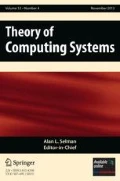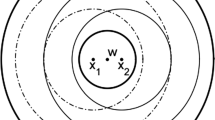Abstract
We introduce generalized notions of low and high complexity classes and study their relation to structural questions concerning bounded probabilistic polynomial-time complexity classes. We show, for example, that for a bounded probabilistic polynomial-time complexity class\(C\) =BPΣ P k ,L \(C\)=H \(C\) implies that the polynomial hierarchy collapses to\(C\). This extends Schöning's result for\(C\)=Σ P k (L \(C\) andH \(C\) are the low and high sets defined by\(C\)). We also show, with one exception, that containment relations between the bounded probabilistic classes and the polynomial hierarchy are preserved by their low and high counterparts.LBPP andLBPNP are characterized asNP ∩BPP andNP ∩ co-BPNP, respectively. These characterizations are then used to recover Boppana, Hastad, and Zachos's result that if co-NP ⊂BPNP, then the polynomial hierarchy collapses toBPNP, and Ko's result that ifNP ⊂BPP, then the polynomial hierarchy collapses toBPP.
Similar content being viewed by others
References
L. Babai, Trading group theory for randomness,Proceedings of the 17th Annual Symposium on the Theory of Computation, 1985, pp. 421–429.
R. Boppana, J. Hastad, and S. Zachos, Does co-NP have short interactive proofs?,Inform. Process. Lett.,25 (1987), 127–132.
L. Fortnow and M. Sipser, Are there interactive protocols for co-NP languages?,Inform. Process. Lett.,28 (1988), 249–251.
J. Gill, Computational complexity of probabilistic Turing machines,SIAM J. Comput.,6 (1977), 675–695.
S. Goldwasser, S. Micali, and C. Rackoff, The knowledge complexity of interactive proof-systems,Proceedings of the 17th Annual Symposium on the Theory of Computation, 1985, pp. 291–304.
S. Goldwasser and M. Sipser, Private coins versus public coins in interactive proof systems,Proceedings of the 18th Annual Symposium on the Theory of Computation, 1986, pp. 59–68.
P. Hinman and S. Zachos, Probabilistic machines, oracles, and quantifiers,Proceedings of the Oberwolfach Recursion-theoretic Week, Lecture Notes in Mathematics, vol. 114, Springer-Verlag, Berlin, 1984, pp. 159–192.
K. Ko, Some observations on the probabilistic algorithms andNP-hard problems,Inform. Process. Lett.,14 (1981), 39–43.
C. Lautemann,BPP and the polynomial hierarchy,Inform. Process. Lett.,17 (1983), 215–217.
U. Schöning, A low and high hierarchy withinNP, J. Comput. System Sci.,27 (1983), 14–28.
U. Schöning, Graph isomorphism is in the low hierarchy,Proceedings of the 4th STACS, Lecture Notes in Computer Science, vol. 247, Springer-Verlag, Berlin, 1986, pp. 114–124. About to appear inJ. Comput. Systems Sci.
U. Schöning,Complexity and Structure, Lecture Notes in Computer Science, vol. 211, Springer-Verlag, Berlin, 1986.
U. Schöning, Probabilistic complexity classes and lowness,Proceedings of the Second Annual Conference on Structure in Complexity Theory, 1987, pp. 2–8. About to appear inJ. Comput. System Sci.
S. Zachos and M. Fürer, Probabilistic quantifiers vs. distrustful adversaries, Manuscript, 1985.
S. Zachos, Robustness of probabilistic computational complexity classes under definitional perturbations,Inform. and Control,54 (1982), 143–154.
Author information
Authors and Affiliations
Rights and permissions
About this article
Cite this article
Klapper, A. Generalized lowness and highness and probabilistic complexity classes. Math. Systems Theory 22, 37–45 (1989). https://doi.org/10.1007/BF02088291
Received:
Revised:
Issue Date:
DOI: https://doi.org/10.1007/BF02088291




